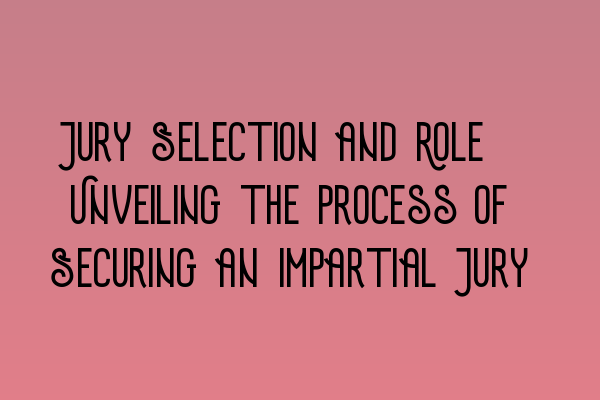Jury Selection and Role: Unveiling the Process of Securing an Impartial Jury
When it comes to criminal trials, one of the fundamental principles of the legal system is the right to a fair trial. Central to this principle is the concept of an impartial jury. In this article, we will explore the process of jury selection and the crucial role that jurors play in the criminal justice system.
The Importance of an Impartial Jury
An impartial jury is essential for a fair trial as it ensures that the accused has a fair and unbiased chance of presenting their case. The jury is made up of individuals from the community who are expected to decide the guilt or innocence of the accused based solely on the evidence presented in court.
Having an impartial jury helps in safeguarding the integrity of the legal process and ensures that the verdict is not influenced by personal biases or prejudices. It is the responsibility of the court to ensure that the jury is fair and impartial.
The Jury Selection Process
The process of selecting a jury involves several stages. Let’s take a closer look at each step:
- Potential jurors are chosen from the community using various sources such as voter registration lists, driver’s license databases, and other public records. This ensures that the jury represents a cross-section of the community.
- Once selected, the potential jurors are summoned to appear in court. They are then subjected to a process called voir dire, where the prosecution and defense attorneys have an opportunity to question prospective jurors to determine any potential biases or prejudices that may affect their ability to be impartial.
- During voir dire, both sides have the right to challenge potential jurors. This can be done through challenges for cause, where a juror is disqualified due to a specific reason such as a personal connection to the case, or through peremptory challenges, where a juror can be dismissed without providing a reason.
- After the challenges, the remaining jurors are selected to serve on the jury. The number of jurors needed may vary depending on the jurisdiction and the specific case.
It is important to note that the selection of a jury is not a perfect science. While efforts are made to ensure impartiality, it is possible for biases to exist that may affect the juror’s ability to be fair and objective.
The Role of Jurors
Jurors have a crucial role in the criminal justice system. They are responsible for listening to the evidence presented in court, weighing the facts, and coming to a verdict. It is their duty to apply the law as instructed by the judge and reach a unanimous decision, or in some cases, a majority decision.
Jurors play a unique role in the legal process as they act as the voice of the community. Their decision reflects the collective conscience of society and carries significant weight in determining the fate of the accused.
It is essential for jurors to approach their role with an open mind, free from any preconceived notions or biases. They must base their decision solely on the evidence presented in court and the instructions provided by the judge.
Conclusion
Jury selection is a critical component of the criminal justice system. It ensures the right to a fair trial by securing an impartial jury. The process involves careful screening of potential jurors and the elimination of those who may have biases or conflicts of interest. The jury, in turn, plays a vital role in the legal process by listening to evidence, applying the law, and reaching a verdict.
For more information on legal topics, please check out these related articles:
- LLC Formation Made Simple: Step-by-Step Guide for UK Entrepreneurs
- Business Regulations in the UK: A Comprehensive Overview
- Preparing for the SQE Exam: Strategies and Resources for Success
- SQE Workshops and Webinars: Accelerate Your Exam Preparation
- Delaware Corporate Law for UK Solicitors: Key Insights and Practices
